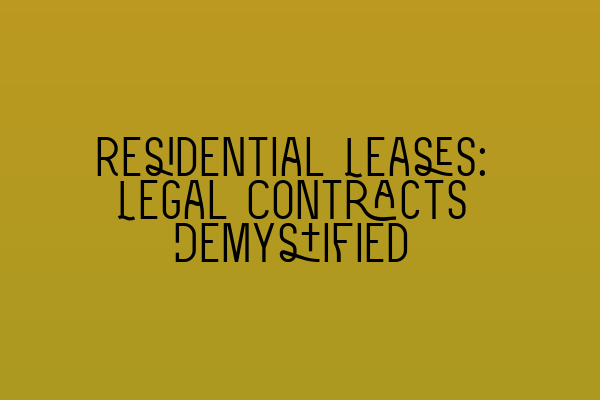Residential Leases: Legal Contracts Demystified
Welcome to SQE Property Law & Land Law! As solicitors specializing in property law, we understand the importance of having a clear understanding of residential leases. In this blog post, we will demystify residential leases and provide you with the essential information you need to know.
A residential lease is a legal contract between a landlord and a tenant, outlining the rights and responsibilities of each party. It sets out the terms of the tenancy, including the duration, rent, and any additional conditions that both parties have agreed upon.
Now, let’s dive into the key components of a residential lease to help you fully grasp the intricacies of this legal contract.
1. Parties: The lease will identify the landlord, who owns the property, and the tenant, who will occupy the property. Each party has certain rights and responsibilities that must be upheld throughout the duration of the lease. To learn more about the role of parties in a contract and their respective rights and responsibilities, check out our related article, “Parties in a Contract: Rights and Responsibilities”.
2. Duration: The lease will specify the duration of the tenancy, whether it’s a fixed term or ongoing. It’s crucial to understand the implications of the duration, as it affects the flexibility and stability of your tenancy.
3. Rent: The lease will outline the amount of rent the tenant is obligated to pay and the frequency of payments. It’s important to clarify whether the rent includes any additional charges, such as utilities or maintenance fees. Being aware of these details will prevent any misunderstandings or surprises down the line.
4. Obligations: The lease will delineate the responsibilities of both the landlord and the tenant. The tenant is generally responsible for maintaining the property, while the landlord is responsible for ensuring the property meets certain standards. It’s essential to carefully review these obligations to understand your rights and duties as a tenant.
5. Repairs and Maintenance: The lease should clearly state who is responsible for repairs and maintenance of the property. Typically, the landlord is responsible for structural issues, while the tenant is responsible for minor repairs and general upkeep. However, it’s critical to have a thorough understanding of these responsibilities to avoid any disputes and unnecessary expenses.
6. Termination: The lease will specify the conditions under which either party can terminate the tenancy. It’s important to be aware of the notice period required and any penalties or fees associated with early termination. Knowing your rights and obligations in this regard will help you plan your tenancy accordingly.
Understanding the ins and outs of a residential lease can be complex, but with the right knowledge and guidance, you can navigate this legal contract with confidence. Now that we’ve broken down the key elements of a residential lease, you should have a clearer understanding of its intricacies.
If you want to test your knowledge of contract law and further enhance your understanding of legal contracts, take a look at our related article, “Interactive SQE Mock Tests for Contract Law: Test Your Knowledge”. It’s a valuable resource for aspiring solicitors and anyone interested in developing their contract law expertise.
Additionally, if you’re interested in learning more about other essential aspects of contract law, such as duress and undue influence, consideration, and damages, be sure to check out our related articles:
– “Unveiling Duress and Undue Influence in Contracts”
– “Essentials of Consideration: Understanding the Backbone of Contracts”
– “Damages in Contract Law: Assessing Financial Compensation”
At SQE Property Law & Land Law, we strive to provide you with comprehensive and accessible legal information. We hope this blog post has shed some light on residential leases and empowered you with the knowledge you need to confidently navigate this area of property law. If you have any specific questions or require legal assistance, please don’t hesitate to get in touch with our experienced team.
